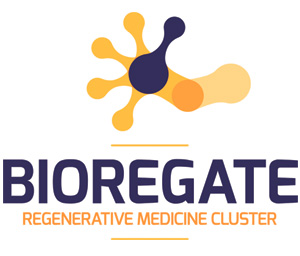Healthy tissues surrounding abdomino-pelvic tumours can be impaired by radiotherapy, leading to chronic gastrointestinal complications with substantial mortality. Adipose-derived Mesenchymal Stromal Cells (Ad-MSCs) represent a promising strategy to reduce intestinal lesions. However, systemic administration of Ad-MSCs results in low cell engraftment within the injured tissue. Biomaterials, able to encapsulate and withstand Ad-MSCs, can overcome these limitations. A silanized hydroxypropylmethyl cellulose (Si-HPMC) hydrogel has been designed and characterized for injectable cell delivery using the operative catheter of a colonoscope. We demonstrated that hydrogel loaded-Ad-MSCs were viable, able to secrete trophic factors and responsive to the inflammatory environment. In a rat model of radiation-induced severe colonic damage, Ad-MSC + Si-HPMC improve colonic epithelial structure and hyperpermeability compared with Ad-MSCs injected intravenously or locally. This therapeutic benefit is associated with greater engraftment of Si-HPMC-embedded Ad-MSCs in the irradiated colonic mucosa. Moreover, macrophage infiltration near the injection site was less pronounced when Ad-MSCs were embedded in the hydrogel. Si-HPMC induces modulation of chemoattractant secretion by Ad-MSCs that could contribute to the decrease in macrophage infiltrate. Si-HPMC is suitable for cell delivery by colonoscopy and induces protection of Ad-MSCs in the tissue potentiating their therapeutic effect and could be proposed to patients suffering from colon diseases.

